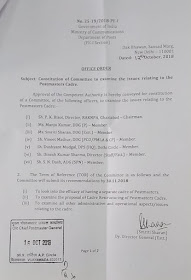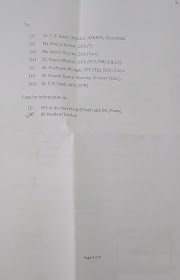Please
refer to my earlier Blogs related to the effective date of MACPS and my
pending Writ petition before the Hon'ble Bombay High Court. Finally, the Court
delivered the judgement on 15-10-2018. The 4 respondents are:-
D.O.P.T. Min.
Fin., Dep. of Expt.
- Cent.Adm.Tribunal,
Mumbai Bench.
D.G.A.(Central),
Mumbai.
Though
the Judgement is based on my Personal Writ Petition, hope DOPT will apply it to
all covered under its jurisdiction.
3. The challenge in this petition to the judgment and order dated 16th
April, 2013 made by the Central Administrative Tribunal (for short 'the CAT'),
dismissing the Original Application No. 145 of 2013 instituted by the
petitioner seeking benefit of Modified Assured Career Progression (MACP) with
effect from 1st January, 2006 along with all other consequential benefits.
4. Mr. M. P. Joseph-the petitioner in person submits that the issue raised
in the present petition is answered in favour of the petitioner by the Hon'ble
Apex Court in the case of Union of India and others Vs. Balbir Singh Turn and
another (2018) 11 SCC 99 and therefore the CAT's impugned judgment and order
may be set aside and the relief prayed for by him in his Original Application
No. 145 of 2013 be granted.
5. The learned Counsel for the respondents submit that the benefit under
the MACP cannot be regarded as any part of the pay structure extended to the
civilian employees and therefore the CAT was justified in denying relief to the
petitioner. The learned Counsel submit that the recommendations of the pay
commissions are not per-se binding upon the Government and the implementation,
including the date from which such recommendations are to be implemented are
matters in the discretion of the Government. Since, in the present case,
implementation in respect of allowances was directed with effect from 1st
September, 2008, the petitioner was not at all justified in seeking
implementation with effect from 1st January, 2006. For these reasons the
learned Counsel for the respondents submit that this petition may be dismissed.
6. The rival contentions now fall for our determination.
7. There is no dispute in the present case that the petitioner is eligible
for receipt of benefits under the MACP. The only dispute is whether the
petitioner is required to be granted the benefits under the MACP with effect
from 1st January, 2006 as claimed by him in his Original Application No. 145 of
2013 or whether such benefits are due and payable to the petitioner with effect
from 1st September, 2008 as contended by and on behalf of the respondents.
8. The sixth pay commission made recommendations with regard to Armed
Forces Personnel. By a resolution dated 30th August, 2008, the Central
Government resolved to accept such recommendations with regard to Personnel
Below Officer Rank (PBOR) subject to certain modifications. Clause (i) of this
resolution as relevant and the same reads as follows:-
“(i) Implementation of the revised pay structure of pay bands and grade
pay, as well as pension, with effect from 1-1-2006 and revised rates of
allowances (except dearness allowances/relief) with effect from 1-9-2008;”
9. As noted earlier, the only issue which arises in the present petition
is whether the benefit under MACP is to be regarded as a part of the pay
structure of pay bands and grade pay or whether such benefit is to be regarded
as “allowances (except dearness allowance/relief)”. If the benefit under MACP
is to be regarded as a part of the pay structure of pay bands and grade pay,
then obviously the petitioner is right in contending that such benefit will
have to be extended to him with effect from 1st January, 2006 in terms of
Clause (i) of the aforesaid resolution dated 30th August, 2008. However, if, as
held by the CAT in the present case, the benefit of MACP is to be regarded as
“allowances (except dearness allowance/relief)”, then the respondents would be
right in their contention that such benefit is payable only with effect from
1st September, 2008.
10. The aforesaid was the precise issue which arose for consideration in
case of Balbir Singh Turn (supra). The Apex Court upon consideration of the
Central Government Resolution dated 30th August, 2008 along with Part-A of
Annexure-I thereto has clearly held that the benefit under MACP is a part of
the pay structure and therefore such benefit was payable from 1st January, 2006
and not from 1st September, 2008.
11. The reasoning is contained in paragraphs 6, 7 and 8 ofMthe Apex Court
ruling, which reads as follows :-
“6. The answer to this question will lie in the interpretation given to
the Government Resolution, relevant portion of which has been quotedhereinabove.
A bare perusal of Clause (i) of the Resolution clearly indicates that the
Central Government decided to implement the revised pay structure of pay bands
and grade pay, as well as pension with effect from 1-1-2006. The second part of
the clause lays down that all allowances except the dearness allowance/relief
will be effective from 1-9-2008. The AFT held, and in our opinion rightly so,
that the benefit of MACP is part of the pay structure and will affect the grade
pay of the employees and, therefore, it cannot be said that it is a part of
allowances. The benefit of MACP if given to the respondents would affect their
pension also.
7. We may also point out that along with this Resolution there is Annexure
I. Part A of Annexure I deals with the pay structure, grade pay, pay bands,
etc., and Item 10 reads as follows:
|
10
|
Assured Career Progression Scheme for PBORs. The Commission
recommends that the time bound promotion scheme in case of PBORs shall allow
two financial upgradations on completion of 10 and 20 years of service as at
present. The financial upgradations under the scheme shall allow benefit of
pay fixation equal to one increment along with the higher grade pay. As
regards the other suggestions relating to residency period for promotion of PBORs
Ministry of Defence may set up an Inter-Services Committee to consider the
matter after the revised scheme of running bands is implemented (Para 2.3.34)
|
Three ACP upgradations after 8, 16 and 24 years of service has been
approved. The upgradation will take place only in the hierarchy of grade
pays, which need not necessarily be the hierarchy in that particular cadre.
|
Part B of Annexure I deals with allowances, concessions and benefits and
conditions of service of defence forces personnel. It is apparent that the Government
itself by placing MACP in Part A of Annexure I was considering it to be the
part of the pay structure.
8. The MACP Scheme was initially notified vide Special Army Instructions
dated 11-10-2008. The Scheme was called the Modified Assured Career Progression
Scheme for Personnel Below Officer Rank in the Indian Army. After the
Resolution was passed by the Central Government on 30-8-2008 Special Army
Instructions were issued on 11-10-2008 dealing with revision of pay structure.
As far as ACP is concerned Para 15 of the said letter reads as follows :
“15. Assured Career Progression. In pursuance with the Government
Resolution of Assured Career Progression (ACP), a directly recruited PBOR as a
Sepoy, Havildar or JCO will be entitled to minimum three financial upgradations
after 8, 16 and 24 years of service. At the time of each financial upgradation
under ACP, the PBOR would get an additional increment and next higher grade pay
in hierarchy.”
Thereafter, another letter was issued by the Adjutant General Branch on
3-8-2009. Relevant portion of which reads as follows :
“... The new ACP (3 ACP at 8, 16, 24 years of service) should be
applicable w.e.f. 1-1-2006, and the old provisions (operative w.e.f. the Vth
Pay Commission) would be applicable till 31-12-2005. Regular service for the
purpose of ACP shall commence from the date of joining of a post in direct
entry grade.”
Finally, on 30-5-2011 another letter was issued by the Ministry of
Defence, relevant portion of which reads as follows:
“5. The Scheme would be operational w.e.f. 1-9-2008. In other words,
financial upgradations as per the provisions of the earlier ACP scheme (of
August 2003) would be granted till 31-8-2008.”
Therefore, even as per the understanding of the Army and other authorities
up till the issuance of the letter dated 30-5-2011 the benefit of MACP was
available from 1-1-2006.”
[emphasis supplied]
12. The CAT, when it delivered the impugned judgment andorder dated 16th
April, 2013 did not have the benefit of the ruling of the Apex Court in Balbir
Singh Turn(supra) which was decided only on 8th December, 2017. The view taken
by the CAT in the impugned judgment and order is now in direct conflict with
the view taken by the Apex Court in Balbir Singh Turn (supra). Obviously,
therefore, the impugned judgment and order will have to be set aside and the
petitioner will have to be held to be entitled to receive the benefits under
MACP with effect from 1st January, 2006 together with all consequential
benefits.
13. The contentions raised by and on behalf of the respondents cannot be
accepted, particularly, in the light of the ruling of the Apex Court in Balbir
Singh Turn (supra). The Apex Court, in clear terms and in the precise context
of Central Government's resolution dated 30th August, 2008 held that the
benefit of MACP is a part of the pay structure and not merely some allowance.
The Apex Court has held that the benefit of MACP affects not only the pay but
also the pension of an employee and therefore, the same, is not an allowance
but part of the pay itself. In terms of Clause (i) of the Central Government's
resolution, admittedly, the pay component became payable with effect from 1st
January, 2006 unlike the allowance component which became payable from 1st
September, 2008.
14. Besides, this is not a case where the petitioner was insisting upon
preponement of the date for implementation of the recommendations of the pay
commission. The Central Government, vide resolution dated 30th August, 2008 had
already accepted the recommendations with regard to POBR, no doubt subject to
certain modifications. The relief claimed by the petitioner was entirely
consistent with Clause (i) of the resolution dated 30th August, 2008, which in
fact required the Government to extend benefits of revised pay structure of pay
bands and grade pay, as well as pension with effect from 1st January, 2006.
15. Accordingly, we dispose of this petition with the following order:-
O R D E R
(a) The impugned judgment and order dated 16th April, 2013 made by the CAT
is hereby set aside.
(b) The petitioner is held entitled to receive the benefit of MACP with
effect from 1st January, 2006 together with all consequential benefits.
(c) The respondents are directed to work out the benefits of MACP with
effect from 1st January, 2006 together with consequential benefits and to pay
the same to the petitioner as expeditiously as possible and in any case within
a period of three months from today.
(d) If, such benefits/consequential benefits are not paid to the
petitioner within three months from today, then the respondents will liable to
pay interest thereon @ 6% p.a. from the date such payments became due and
payable, till the date of actual paymen.
(e) Rule is made absolute in the aforesaid terms. There shall however be
no order as to costs.
( M. S. SONAK, J. )
( A. S. OKA, J. )


